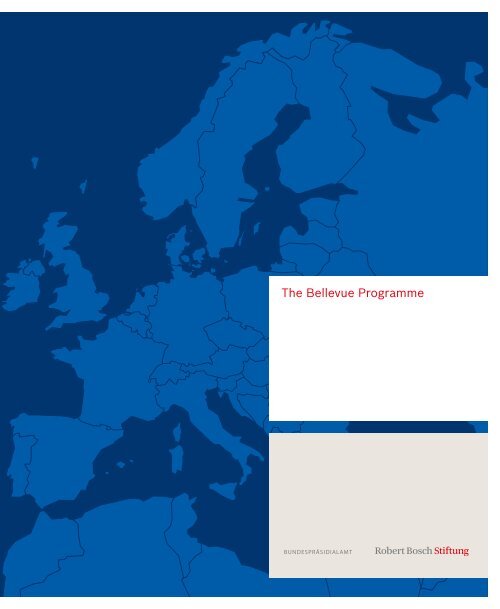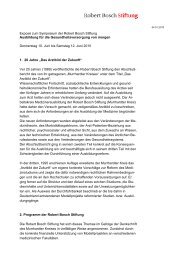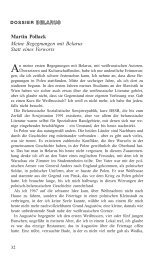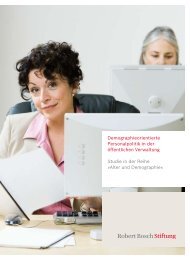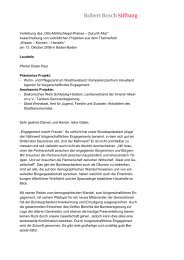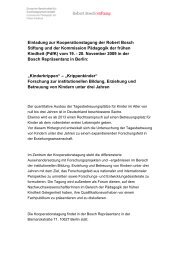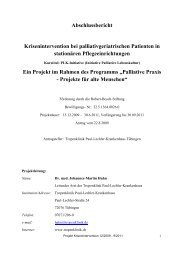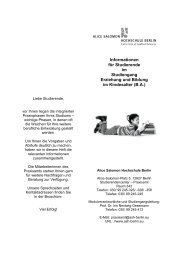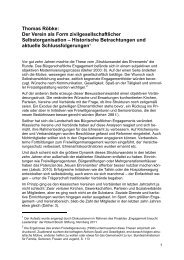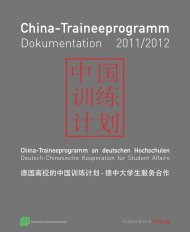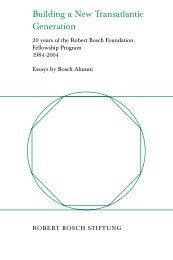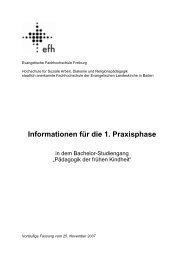The Bellevue Programme - Robert Bosch Stiftung
The Bellevue Programme - Robert Bosch Stiftung
The Bellevue Programme - Robert Bosch Stiftung
- No tags were found...
You also want an ePaper? Increase the reach of your titles
YUMPU automatically turns print PDFs into web optimized ePapers that Google loves.
<strong>The</strong> <strong>Bellevue</strong> <strong>Programme</strong>
<strong>The</strong> <strong>Bellevue</strong> <strong>Programme</strong>5791014182122IntroductionGoalsBenefits<strong>Programme</strong>Organizational mattersApplicationPartner institutionsContact:: Promoting cross-border cooperation in Europe:: Exchange of government employees between eightEuropean partner countries:: 12-month work placements for highly qualified youngexecutives in key government authoritiesUnder the auspices ofChristian Wulff, President of the Federal Republic of GermanyPál Schmitt, President of the Republic of HungaryMary McAleese, President of the Republic of IrelandGiorgio Napolitano, President of the Republic of ItalyBronisław Komorowski, President of the Republic of PolandAníbal Cavaco Silva, President of the Republic of PortugalDanilo Türk, President of the Republic of SloveniaHis Majesty Juan Carlos I, King of SpainPartner countriesGermany, Hungary, Ireland, Italy, Poland, Portugal, Slovenia, Spain
IntroductionEuropean integration continues apace. <strong>The</strong> Treaty of Lisbon represented a vitalstep forward for the European Union’s development over the years ahead. Itincluded institutional changes that will strengthen and deepen European integration.People are the lifeblood of any institution. Indeed, institutions can only be asgood or productive as the people who work for them. Likewise, European integrationcan only succeed if the people who work in the agencies and institutionsof Europe’s many member states are filled with the European spirit and arefamiliar with and understand their partners in this endeavour. We need peoplewho are Europeans by conviction in the key posts, who embody a European wayof life and a European way of thinking.We also need to do ever more to learn about each other in Europe. We especiallyneed to become more familiar with procedures and structures in national ministriesand administrations, each of which has its own traditions and culture.This is where the <strong>Bellevue</strong> <strong>Programme</strong> for highly qualified young executivescan make a major contribution. Everyone who takes part will learn from withinjust how people from the participating partner states think and feel, and howtheir governments and authorities work. <strong>The</strong>y will furthermore make their ownpersonal cross-border contacts and build bridges of understanding to foster adeeper understanding of what we have in common, but also of our differencesand national characteristics.For these reasons I recommend the <strong>Bellevue</strong> <strong>Programme</strong> – not only in mycapacity as Federal President, but also from personal conviction. I would like tothank all the supporters and sponsors of the project, and wish all participants ayear of enriching experiences that strengthen their commitment to building abright future for our shared continent of Europe.Christian WulffPresident of the Federal Republic of Germany
Participants usually move into higher positions whenthey return from the <strong>Bellevue</strong> year as they are givenpreferential consideration when it comes to selectingstaff for promotion.Helena Rato, National Institute of Public Administration (Instituto Nacional de Administração), Lisbon
7GoalsAccelerating integration of the EuropeanUnion presents the member states with thechallenge of developing new forms of crossbordercooperation. Government policy isdefined increasingly by European law, andthe expanding competencies of the EuropeanUnion now touch on areas that used to be thepreserve of national government. At the sametime, domestic and security issues like immigrationrequire multilateral agreement and ashared approach.Cross-border working relations cannot beestablished by institutions, but by the peoplewho work in them. To overcome the barriersbetween national governments, we needpersonal networks and an understandingof the different work cultures.<strong>The</strong> question is how staff in our nationalministries can be prepared to participate inthis endeavor. <strong>The</strong> initial requirement is anexcellent academic degree as well as a periodof qualification in the national administrationsystem. In addition, every civil servant whoassumes responsibility at the European levelshould acquire practical experience inanother European member country for anextended period of time.<strong>The</strong> programme promotes the participants’professional, intercultural and Europeanpolicy expertise and hence their capacityto assume leadership positions; and it intensifiescross-border cooperation betweenthe ministries, thereby enhancing their Europeanoutlook and competence.<strong>The</strong> <strong>Bellevue</strong> <strong>Programme</strong> is deliberately notbilateral but a rotating exchange betweenEuropean partner countries that is designedto foster a pan-European network amongpublic administrators over time. <strong>The</strong> <strong>Bellevue</strong><strong>Programme</strong> is unprecedented in Europe interms of its duration, intensity, and numberof participating countries.<strong>The</strong> programme was established in 2004 bythe <strong>Robert</strong> <strong>Bosch</strong> <strong>Stiftung</strong> together with theOffice of the Federal President in Germany.It derives its name from Schloss <strong>Bellevue</strong>,the official residence of the President of theFederal Republic of Germany. <strong>The</strong> <strong>Robert</strong><strong>Bosch</strong> <strong>Stiftung</strong> funds the programme andis responsible for its implementation.<strong>The</strong> programme provides highly qualifiedyoung executives from key governmentauthorities across eight EU member stateswith a 12-month work placement in oneof the partner countries.Helena Rato
In the past, we had to exchange official correspondencefor months just to deal with problemsin the taxation of cross-border transactions.Now I can simply call up my colleagues in Berlin.Mariusz Każuch, National Financial Supervisory Authority (Urząd Kontroli Skarbowej w Warszawie), Poland<strong>Bellevue</strong> Fellow 2005/06, work placement in Germany: Federal Ministry of Finance
9Benefits<strong>The</strong> intensity and duration of the work placementabroad during the <strong>Bellevue</strong> <strong>Programme</strong>provides participants with the opportunityfor personal and professional qualification ina form that cannot be achieved in nationaladministration systems. At the same time, theprogramme offers the home institutions anadditional tool for long-term staff development.This helps the participating ministries preparetheir civil servants for leadership responsibilitieswith a European focus.Being host to a <strong>Bellevue</strong> Fellow is also a goodinvestment for the institution concerned.In addition to playing a responsible role inday-to-day business, the Fellow can alsocontribute experience and expertise fromthe home country and provide a fresh perspectiveon national procedures and topics.<strong>The</strong> <strong>Bellevue</strong> Fellows benefit not only fromenhanced professional development, but alsofrom broadening their personal horizonsby living and working in a foreign country,where they will also acquire proficiency ina foreign language.Mariusz KażuchDuring their work assignment abroad, the<strong>Bellevue</strong> Fellows can establish long-lastingrelations between the expert departmentsin their home and host countries, relationsthat can be of benefit for both departments.Personal contacts across borders will helpimprove informal exchange about policyissues, cooperation in multilateral workinggroups and the joint preparation of Europeanmonitoring and regulatory initiatives.<strong>The</strong> member states of the European Unionface different challenges when dealing withpolicy issues of both an economic-technicaland legal nature, which is often due to theirdifferent historical and economic backgrounds.Intensive work in the host institutionwill enable the <strong>Bellevue</strong> Fellows to understanddevelopments in their host country anddiscover approaches to solutions that maybe used back home.“In order to have a successful <strong>Bellevue</strong>year, you need to be able to speak thelanguage of the guest country as well aspossible, set clear goals, and have a senseof humor.”Éva HrusztinskiAfter graduating in agricultural sciencein Gödöllő, Hungary, she worked for theHungarian Ministry of Agriculture andRegional Development where she helpedprepare for Hungary’s entry into theEuropean Union. During her <strong>Bellevue</strong>year, which she spent in Germany at theFederal Ministry for Food, Agricultureand Consumer Protection, she was ableto discover new working methods, developnew perceptions of the EU and experiencecooperation between differentcountries.<strong>Bellevue</strong> Fellow 2007/08
10Gabriele ScheuerJohn Dolan<strong>Programme</strong>Process and duration<strong>The</strong> programme begins with an introductoryseminar in September. Language courses canbe taken in the host country during the threemonths from October to December if theseare needed for preparation. <strong>The</strong> Fellows thenwork in their host institution for 12 monthsfrom January to December.Work placements<strong>The</strong> success of the <strong>Bellevue</strong> year dependson the quality and intensity of their work inthe host institution. <strong>The</strong> Fellow should bedeployed as a regular member of staff in linewith his or her professional qualifications.<strong>The</strong> supervisor will draw up an ambitiousprofile of tasks with the Fellow, ensuring thatboth sides benefit from the activities involved.<strong>The</strong> Fellows themselves are responsible fordeveloping a network of contacts in the hostinstitution and for making suggestions regardingprojects and working groups theywould like to support with their professionalexperience.SeminarsIn addition to gaining work experience in thehost country, which is the key goal of theprogramme, seminars are organized to ensurethe acquisition of additional professionaland methodological training. <strong>The</strong>y alsooffer participants the opportunity to developa personal network among each other.Gabriele ScheuerAfter many years as a judge, GabrieleScheuer moved to Germany’s FederalMinistry of Justice to support negotiationson international legal affairs. In 2006/07,she was involved in the preparations forthe German presidency of the EU in 2007.She spent her <strong>Bellevue</strong> year in Slovenia,when the country held the EU presidency,which afforded her unique insights andthe opportunity to use her experiencefrom the German presidency in the hostinstitution. Her role as adviser coveredfamily and international criminal law.<strong>Bellevue</strong> Fellow 2007/08<strong>The</strong> Introductory Seminar in Berlin offersan insight into current social and politicalchallenges in Germany through presentationsby and meetings with key decision-makers.<strong>The</strong> Fellows discuss their plans for the workplacement and formulate their own professionaland personal goals. <strong>The</strong>y also havethe opportunity to meet and exchange experienceswith their peers of the current programmeyear. Participants are expected tohave a basic knowledge of the structuresand functions of the European Union.
11<strong>The</strong> <strong>Bellevue</strong> <strong>Programme</strong> is a prestigious programmeproviding major benefits to both participants andtheir home institutions. It offers a unique opportunityto civil servants to gain valuable insights into theculture and core principles which form the systemsof public administration in other countries, andpromotes the concepts of knowledge sharing andgreater cooperation.John Dolan, Department of Finance, Ireland
I discovered what it meant to be part of the Europeanfamily while working in Germany’s FederalMinistry of the Interior. <strong>The</strong>re are many possibilitiesfor successful and productive cooperation betweenItaly and Germany.Pier Luigi Piva, Ministry of the Interior (Ministero Dell’ Interno), Italy<strong>Bellevue</strong> Fellow 2008/09, work placement in Germany: Federal Ministry of the Interior
“A voyage into the unknown is what the<strong>Bellevue</strong> <strong>Programme</strong> felt like for mebefore it began, but it turned out to be themost wonderful, most exciting and mostchallenging year I have ever had. Myself-confidence and my curiosity werestrengthened, I made new friends andI now feel like a Slovenian, a Madrileñaand a European all at the same time.”11<strong>The</strong> EU Seminar gives the Fellows the opportunityto go to Brussels and Strasbourg tomeet high-ranking representatives of Europeaninstitutions and to improve theirunderstanding of the EU. During the 10-dayseminar, they learn about current developmentsin Europe, familiarize themselves withthe political culture of the European Unionand understand its role in their work, both intheir home and in their host country.Leadership and team skills are, of course,prerequisites for the Fellows’ professionalcareer paths. <strong>The</strong>y can consequently beaddressed at a high level in the LeadershipDevelopment Seminar: Training in internationalnegotiations, rhetoric and strategicdecision-making will enable the participantsto develop their skills and acquire new expertisethrough intensive practical exercises.<strong>The</strong> seminar takes place half way throughthe programme in the summer and providesa good opportunity to check the achievementof goals, plan the next objectives forthe remaining months and exchange experiencesin the host country with the otherFellows on the programme.<strong>The</strong> <strong>Robert</strong> <strong>Bosch</strong> <strong>Stiftung</strong> invites the Fellowsto a Final Seminar at the end of the programmeyear where they exchange their fresh experienceswith the next group of Fellows.Lidija CvetkovićAfter graduating from the Faculty of Lawat the University of Ljubljana, LidijaCvetković worked as a legal adviser in therevision of public procurement law inSlovenia’s National Revision Commission.For her <strong>Bellevue</strong> year, she chose an areain which she could gain experience in thecooperation of different public administrations.In the Office of the President ofthe Government of Spain, she was mainlyinvolved in matters concerning theexchange of knowledge for the networkfor European cooperation in publicadministration (the EUPAN-Network).She also helped prepare for Spain’spresidency of the EU in 2010.<strong>Bellevue</strong> Fellow 2008/09Alumni activities<strong>The</strong> network of Fellows is maintained beyondthe programme year. <strong>The</strong> <strong>Robert</strong> <strong>Bosch</strong><strong>Stiftung</strong> supports annual alumni meetings,which serve to maintain contact among all<strong>Bellevue</strong> alumni, across all programme yearsand countries, and provide former Fellowsthe opportunity for personal and professionalexchange.Lidija Cvetković
14Hasso BuchruckerOrganizational mattersWork placementParticipation in the programme is seen asa human resources development measure.Applicants must therefore have the approvalof their supervisors and human resourcesdepartments. <strong>The</strong> participating civil servantsare released for a maximum of 15 monthsunder retention of their existing contract andare seconded to the host institution for aperiod of 12 months. <strong>The</strong> home institutionscontinue to pay the regular salary (withoutany foreign supplement) for the duration ofthe deployment. Reintegration after completionof the programme must be guaranteed.Support from the <strong>Robert</strong> <strong>Bosch</strong> <strong>Stiftung</strong><strong>Bellevue</strong> Fellows receive a monthly stipendfrom the <strong>Robert</strong> <strong>Bosch</strong> <strong>Stiftung</strong> to cover expensesrelated to the deployment abroad.Supplements may be paid for accompanyingspouses and children upon request. <strong>The</strong>foundation also reimburses relocation costsand the cost of language courses up to a specifiedmaximum. <strong>The</strong> travel and accommodationcosts for seminars and other obligatoryevents will also be covered. <strong>The</strong> <strong>Robert</strong> <strong>Bosch</strong><strong>Stiftung</strong> and the national partner institutionsof the host country (every country has aninstitution that acts as partner to the <strong>Bellevue</strong><strong>Programme</strong>) will support the programmeparticipants in organizational matters. Thisdoes not apply to issues of personnel and taxlaw associated with the foreign deployment.Choosing the host country, language skills<strong>The</strong> choice of the host country should bebased on the professional interests of theFellows, as well as their language skills andthe strategic interests of their employer.Good knowledge of the language of the hostcountry is desirable and will, of course,facilitate work in the host institution. Experiencehas shown, however, that basic knowledgeand intensive language training beforethe start of the programme are sufficientfor a productive work experience in the hostcountry. <strong>The</strong> final decision on the choice ofa host country is taken after the participantshave been admitted to the programme inconsultation with the <strong>Stiftung</strong> and the nationalpartner institutions. <strong>The</strong> capacity of the hostcountry to accept Fellows also plays a role.
We had the situation, for instance, that a <strong>Bellevue</strong>Fellow from Poland working in Germany’s FederalMinistry of Finance was involved in negotiations atthe European Commission as a member of a delegationin Brussels, and a colleague from Portugal, whowas working in the Federal Ministry for EconomicCooperation and Development, was also involvedin the negotiations. That is a positive result.Hasso Buchrucker, former Amdassador, former senior adviser to the <strong>Bellevue</strong> <strong>Programme</strong>
16My time spent at the Ministry of Justice in Italy wasboth a challenge and a wonderful experience, andI am glad that my home institution supported me.<strong>The</strong> most important thing for me was that the peoplebehind all the paperwork became genuine friends.Diána Mecsi, Ministry of Justice (Igazs.gügyi Minisztérium), Hungary<strong>Bellevue</strong> Fellow 2007/08, work placement in Italy: Ministry of Justice (Ministero della Giustizia)
17Choosing the host institution<strong>The</strong> choice of the host institution is generallybased on the Fellows’ professional backgroundsand the skills and experiences theycan contribute. A specific professional interestrelated to current political and socialdevelopments should be the prime criterion.<strong>The</strong> desire of the home institution to forgecloser ties with a ministry in the host countryis also a frequent consideration. It is importantto bear in mind that the structures ofministries in the partner countries may differ.<strong>The</strong> search for a suitable host institution isthe task of the <strong>Bellevue</strong> Fellow, who will besupported by the <strong>Robert</strong> <strong>Bosch</strong> <strong>Stiftung</strong> andthe national partner institutions. Any existingcontacts of the home institution should, ofcourse, be utilized. <strong>The</strong> Fellow will be invitedto an interview in the host institution beforethe secondment begins. <strong>The</strong> home and hostinstitutions should jointly formulate a targetagreement for the programme to ensure thatthe <strong>Bellevue</strong> year can be taken into accountin performance appraisals.In general, no contract is concluded with thehost institution. <strong>The</strong> Fellow must be grantedaccess to internal information systemsand receive a suitably equipped workplace.Health and safety, insurance and liabilityissues are regulated on a case-by-case basis.Diána MecsiDiána Mecsi spent her <strong>Bellevue</strong> year in theOffice of International Legal Cooperationin the Italian Ministry of Justice. She waspreviously an adviser in the InternationalCooperation Department in Ministry ofJustice in her home country, Hungary. Herministerial career began in 2003 in theDepartment of EU Law until Hungary’saccession to the EU. Before this, she wasan attorney candidate and worked as acivil and commercial consultant. Shegraduated in law and political sciencefrom ELTE University in Budapest anddeveloped her knowledge of internationalbusiness law with a postgraduatedegree at Asser College Europe in <strong>The</strong>Hague (Netherlands).<strong>Bellevue</strong> Fellow 2007/08Diána Mecsi
18ApplicationWho can apply<strong>The</strong> <strong>Bellevue</strong> <strong>Programme</strong> is aimed at employeesof key government departments inGermany, Ireland, Italy, Poland, Portugal,Slovenia, Spain and Hungary.It targets civil servants who already haveseveral years of professional experience inpublic administration and have taken on orare preparing for initial leadership responsibilities.Familiarity with the structure andoperations of the European Union is required.Enthusiasm for the European idea goes withoutsaying.We are looking for the decision-makers oftomorrow who want to shape Europeancooperation with commitment and passion.Requirements:: At least 6 years of professional experienceafter graduation:: At least 4 years as a civil servant in keyfederal government departments:: Initial managerial experience or prospectof leadership responsibility:: Outstanding academic qualification(Masters degree or equivalent):: Study and/or work experience abroad:: Excellent knowledge of English:: Good basic knowledge (at least) of thelanguage of the desired host country:: Excellent general education and knowledgeof national and international politics andeconomics:: Pronounced interest in the politicaldevelopment of the European Union:: Negotiating skills:: Team skills:: Initiative and strong performancecommitment:: Excellent writing skills:: Ability and desire to become proficient in anew field of work quickly:: Ability and desire to work in cross-departmentalinterdisciplinary groups
19Documents to be submitted<strong>The</strong> application must include the followingdocuments::: Application form, completed in English:: Detailed CV in English:: Two letters of recommendation, preferablyin English:: Confirmation of secondment approval bysuperior:: Copies of important university degrees andprofessional certificates:: Covering letter in English:Detailed written presentation of the motivesfor applying to the programme, the mid- andlong-term professional goals, and expectationsof the deployment in the host country.<strong>The</strong> letter should indicate how the applicantaims to incorporate the new experiencegained from the programme into his/herfuture career.Selection process<strong>The</strong> application deadline for the programmeyear beginning on October 1 st is March 31 st ofthe same year. <strong>The</strong> partner institutions carryout the pre-selection process. A maximum offour candidates can be proposed from eachcountry. <strong>The</strong> final selection takes place in Mayby a jury composed of representatives fromall partner countries and the <strong>Robert</strong> <strong>Bosch</strong><strong>Stiftung</strong>. Applicants will be informed of thedecision at the end of May.All information on the current applicationprocess as well as the application form isavailable at: www.bosch-stiftung.de/bellevue.
We are all in the same boat in the European Union.I felt like one of the team when carrying out my workin my host institution and this served to strengthenmy feeling of community.Bożena Agnieszka Gronowalska, Civil Aviation Office (Urzad Lotnictwa Cywilnego), Poland<strong>Bellevue</strong> Fellow 2008/09, work placement in Portugal: Ministry of Foreign Affairs (Ministério dos NegóciosEstrangeiros)
Partner institutions21GermanyOffice of the Federal PresidentAndreas WegendHead of Division Human Ressources, Budgetand OrganisationSpreeweg 110557 BerlinTel.: (030) 20 00 23 10Fax: (030) 20 00 19 18andreas.wegend@bpra.bund.dePortugalNational Institute of Public AdministrationHelena RatoDirector of the Research and ConsultancyUnitPalacio dos Marqueses de Pombal2784-540 Oeiras, PortugalTel.: (00 351) 2 14 46 54 63Fax: (00 351) 2 14 46 54 78helena.rato@ina.ptIrelandDepartment of FinanceCivil Service Training & Development CentreJohn DolanPrincipal OfficerCentral Business ParkTullamore, Co. Offaly, IrelandTel.: (00 353) 57 936 36 65Fax: (00 353) 57 936 36 35john.dolan@finance.gov.ieItalyNational School for Public AdministrationProfessor Giovanni TriaDirectorVia dei Robilant 1100135 Roma, ItalyTel.: (00 39) 6 33 56 5421Fax: (00 39) 6 33 56 5254internazionali@sspa.itPolandChancellery of the President of theRepublic of PolandOffice of Foreign AffairsMirosław ŁuczkaDeputy DirectorKrakowskie Przedmieście 48/5000-071 Warszawa, PolandTel.: (00 48) 2 26 95 15 20Fax: (00 48) 2 26 95 15 19miroslaw.luczka@prezydent.plSloveniaOffice of the President of the Republic of SloveniaMagdalena Tovornik, AmbassadorAdviser for Political AffairsErjaceva 17, P.P 3051000 Ljubljana, SloveniaTel.: (0 03 86) 14 78 13 14Fax: (0 03 86) 14 78 13 51magdalena.tovornik@up-rs.siSpainMinistry of Territorial Policy and PublicAdministrationIsabel HernándezDeputy Director-General of Relations withother Administrationsc/ María de Molina, 5028071 Madrid, SpainTel.: (00 34) 91 273 20 93Fax: (00 34) 91 273 20 07misabel.hernandez@mpr.esHungaryOffice of the President of the Republic ofHungaryMárton VajnaHead of the Foreign Office of the PresidentSándor Palace, Szent György tér 1.1014 Budapest, HungaryTel.: (00 36 1) 224 50 42Fax: (00 36 1) 224 50 49bellevue@keh.huBożena AgnieszkaGronowalska
22ContactChristian HänelDeputy Head of DepartmentInternational Relations Western Europe,America, Turkey, Japan, India<strong>Robert</strong> <strong>Bosch</strong> <strong>Stiftung</strong> GmbHHeidehofstraße 3170184 Stuttgart, GermanyTel.: 0711/460 84-975Fax: 0711/460 84-10975christian.haenel@bosch-stiftung.dewww.bosch-stiftung.de/bellevueImprintPublished by<strong>Robert</strong> <strong>Bosch</strong> <strong>Stiftung</strong> GmbHCover design: Hesse Design, DüsseldorfPhotos: Björn Hänssler, Jan Zappner(pp. 8, 12, 20, 21), Tobias Bohm (p. 4, 1 st photofrom left), Bundesbildstelle (p. 4, 2 nd photofrom left), Borja Fotografos (p. 4, 3 rd photofrom left), illuscope (p. 4, 4 th photo from left)© 2010 <strong>Robert</strong> <strong>Bosch</strong> <strong>Stiftung</strong> GmbH,Stuttgart.All rights reserved.
Established in 1964, the <strong>Robert</strong> <strong>Bosch</strong><strong>Stiftung</strong> GmbH is one of the major Germanfoundations associated with a privatecompany. It represents the philanthropicand social endeavors of <strong>Robert</strong> <strong>Bosch</strong>(1861 – 1942) and fulfills his legacy in acontemporary manner. <strong>The</strong> <strong>Robert</strong> <strong>Bosch</strong><strong>Stiftung</strong> works predominantly in the fieldsof International Relations, Health andEducation.


